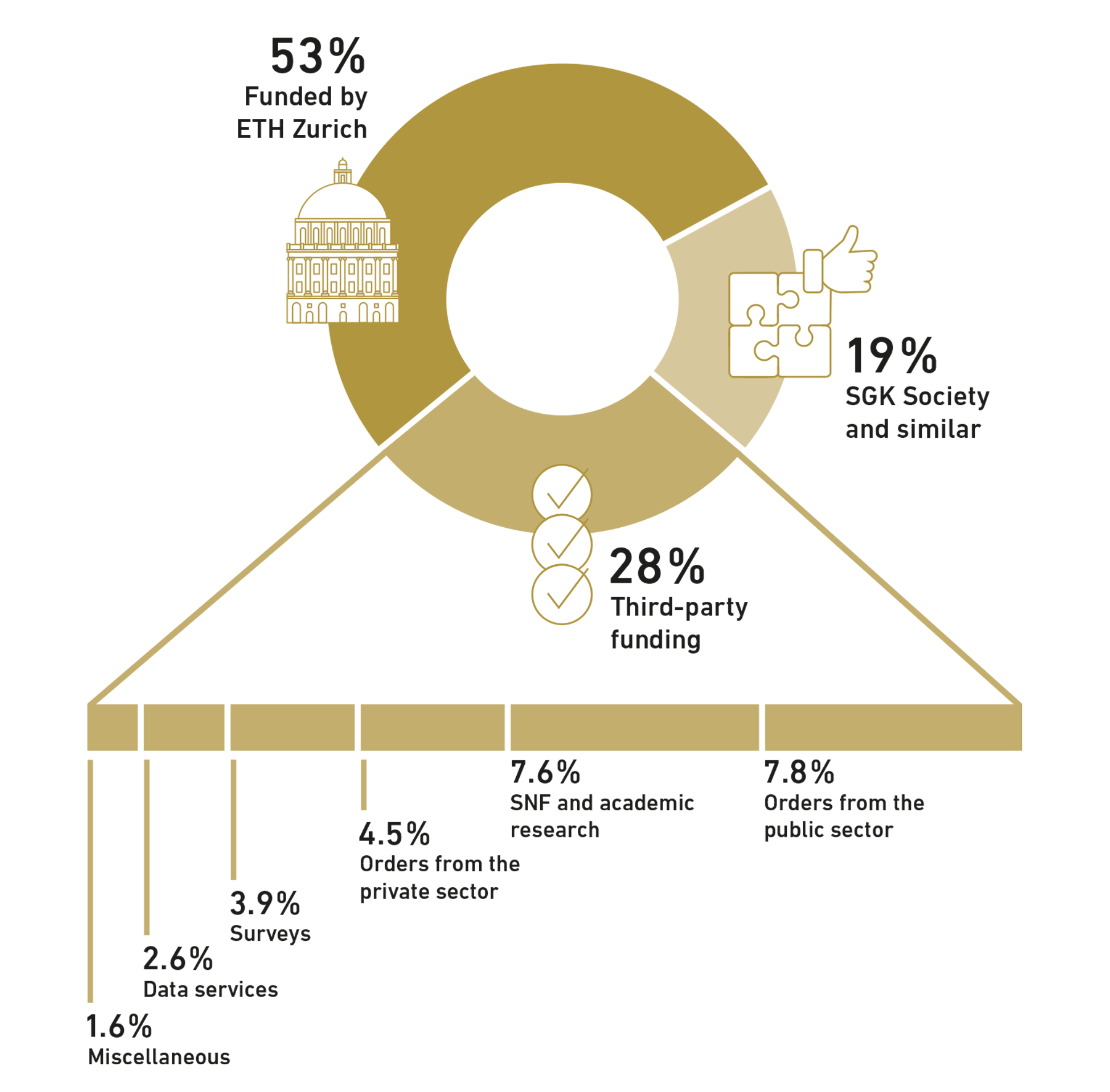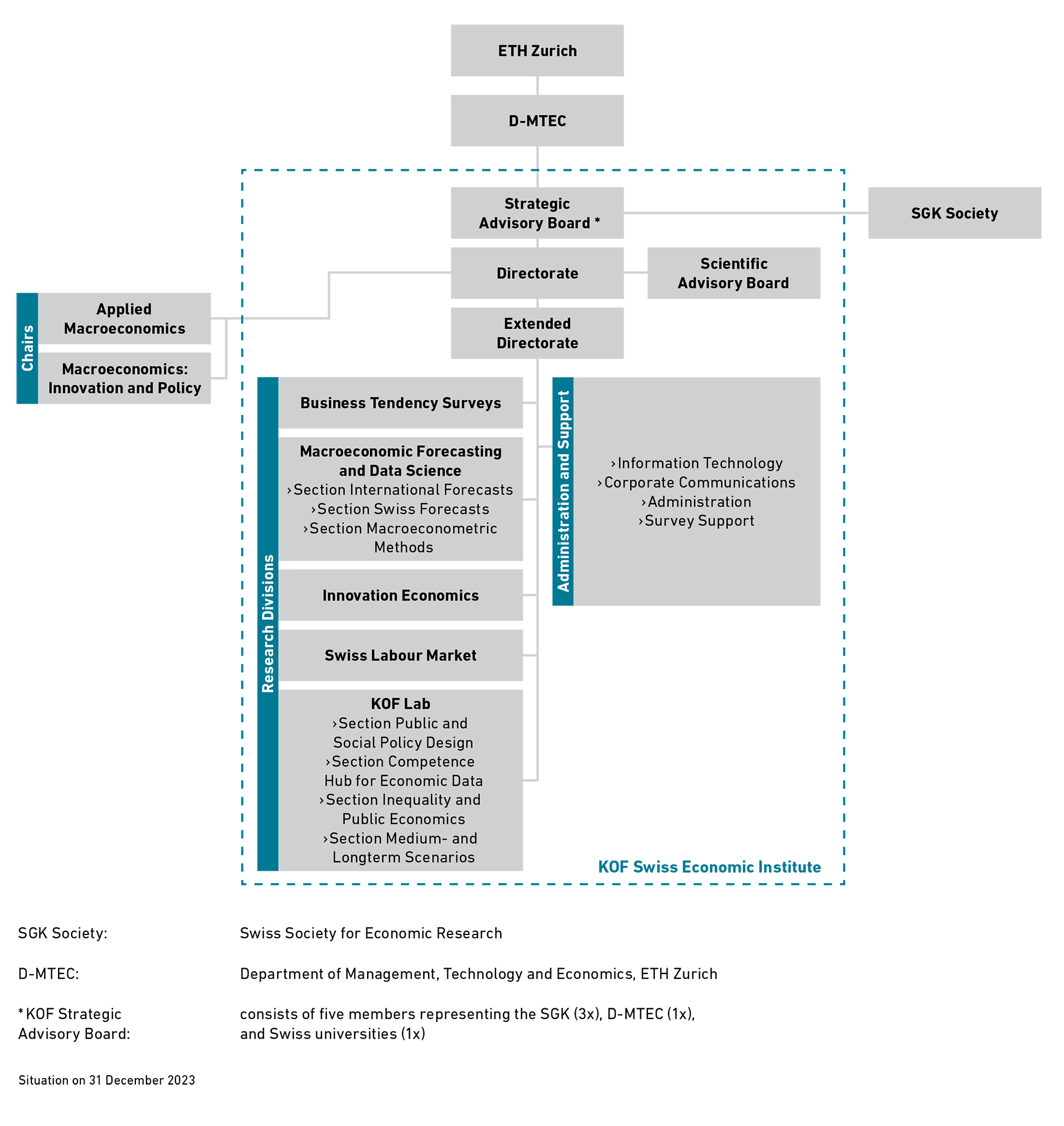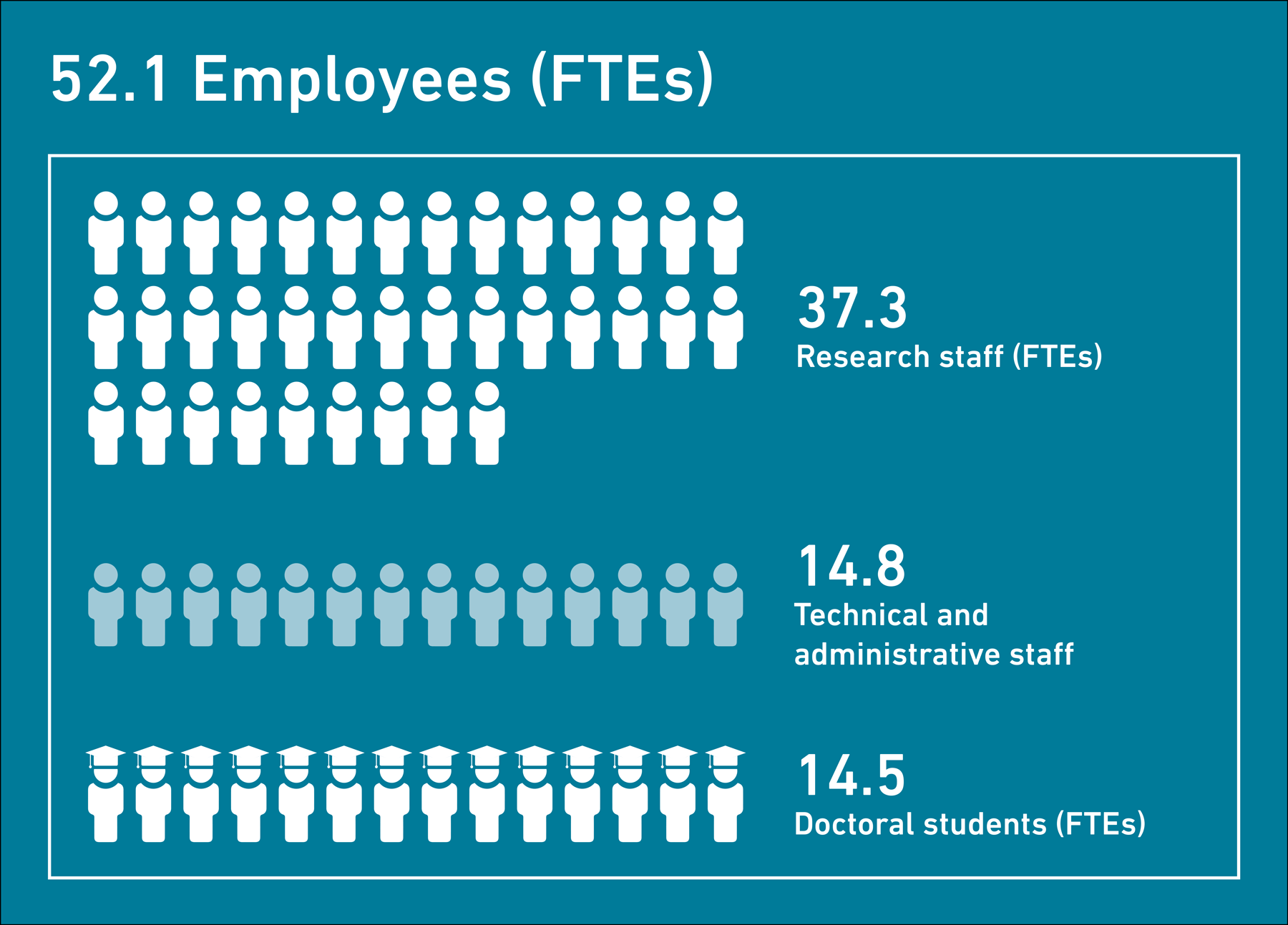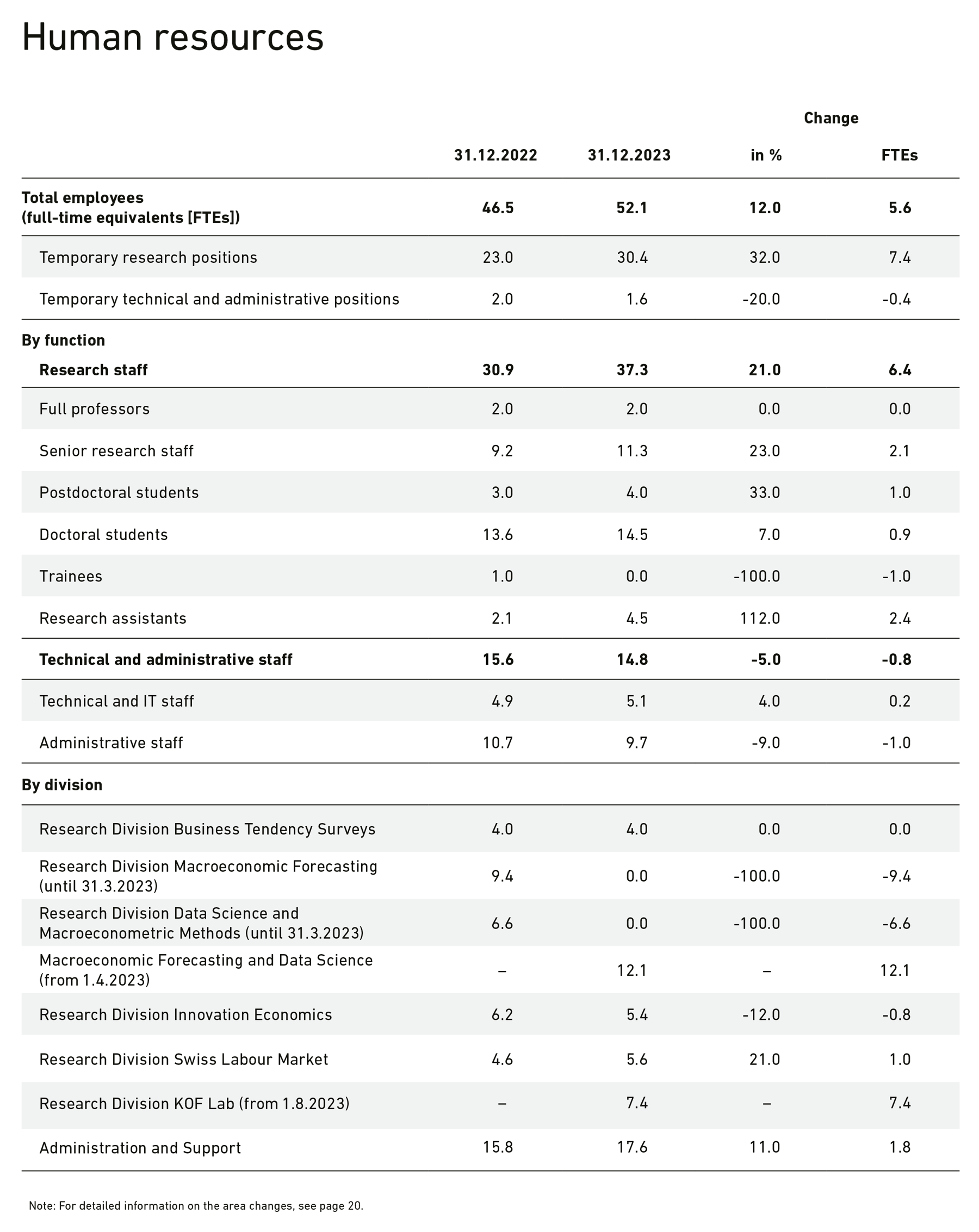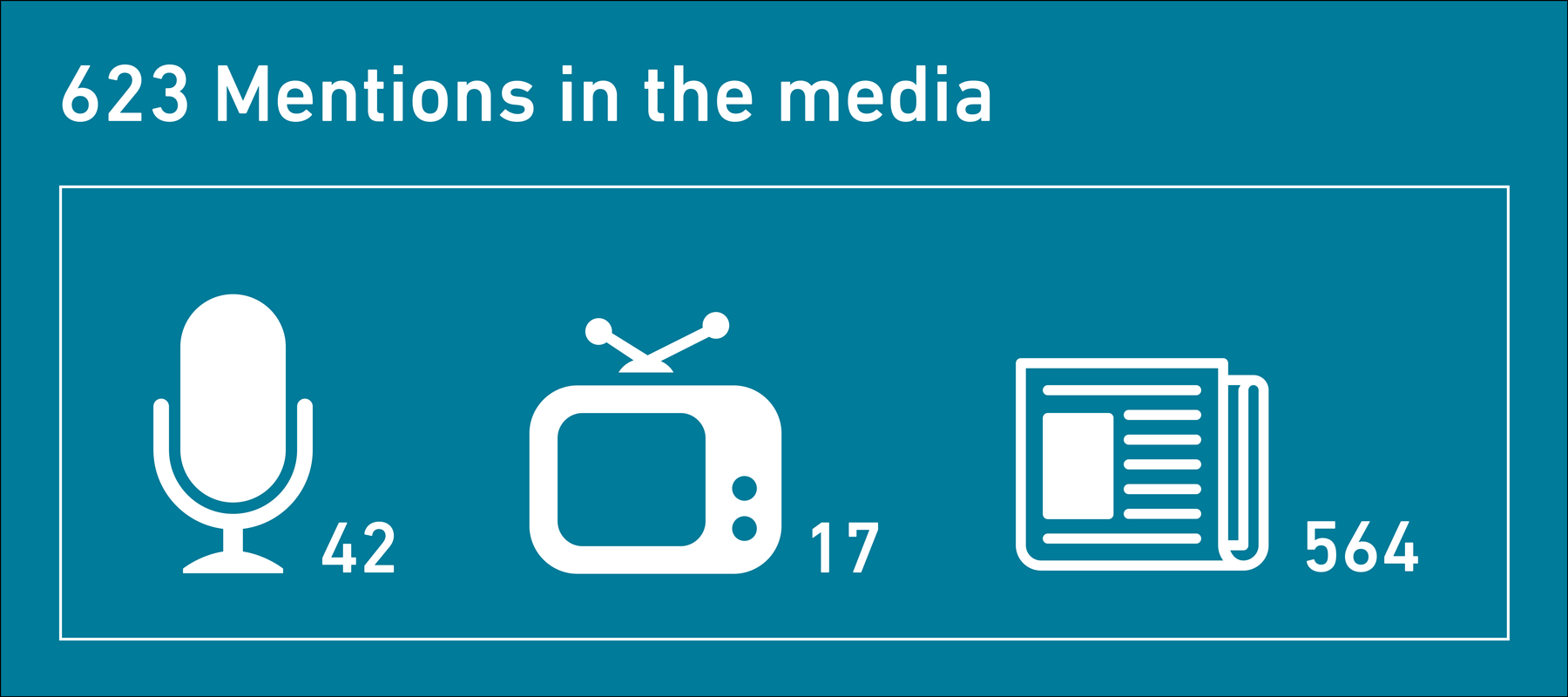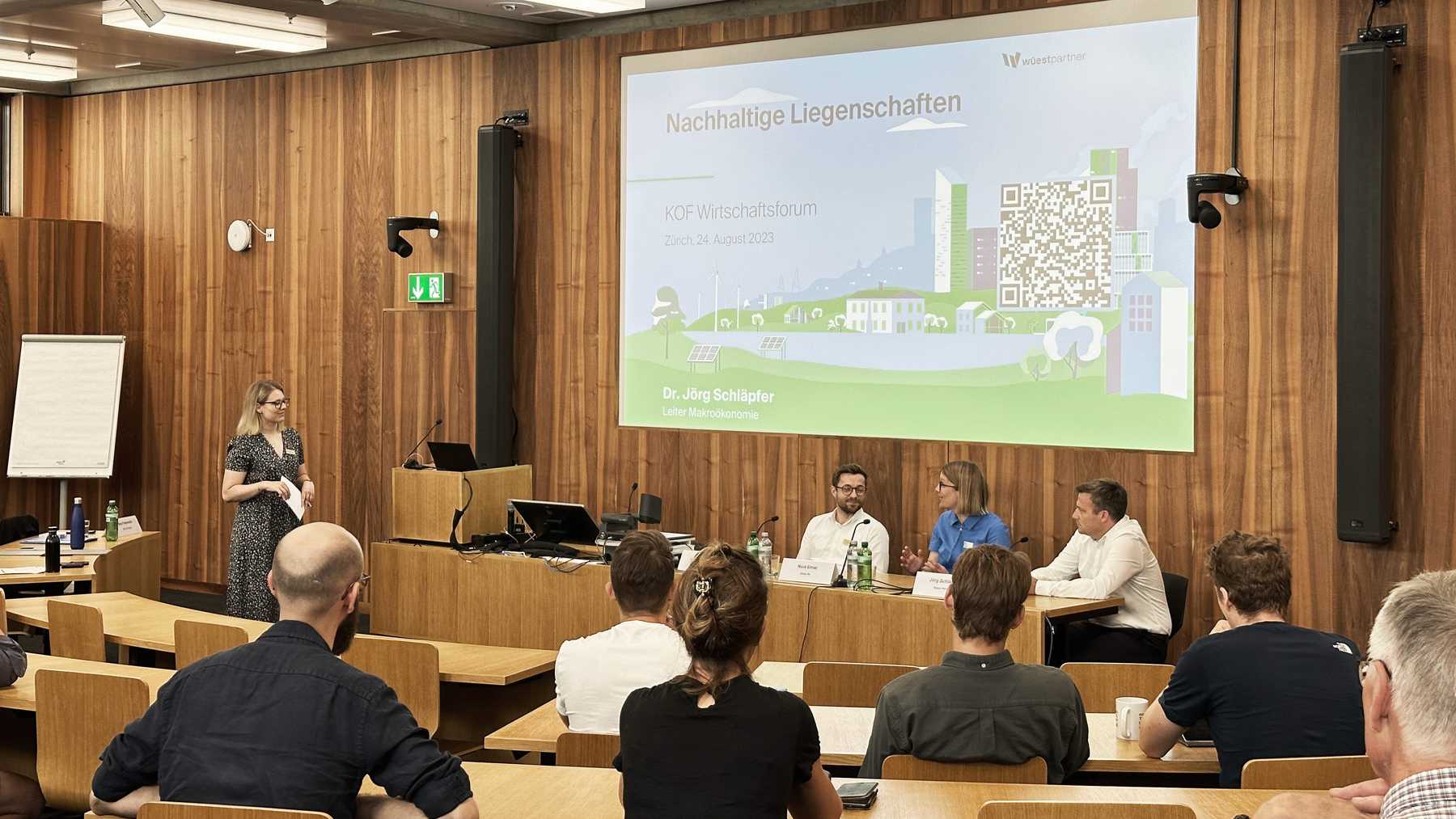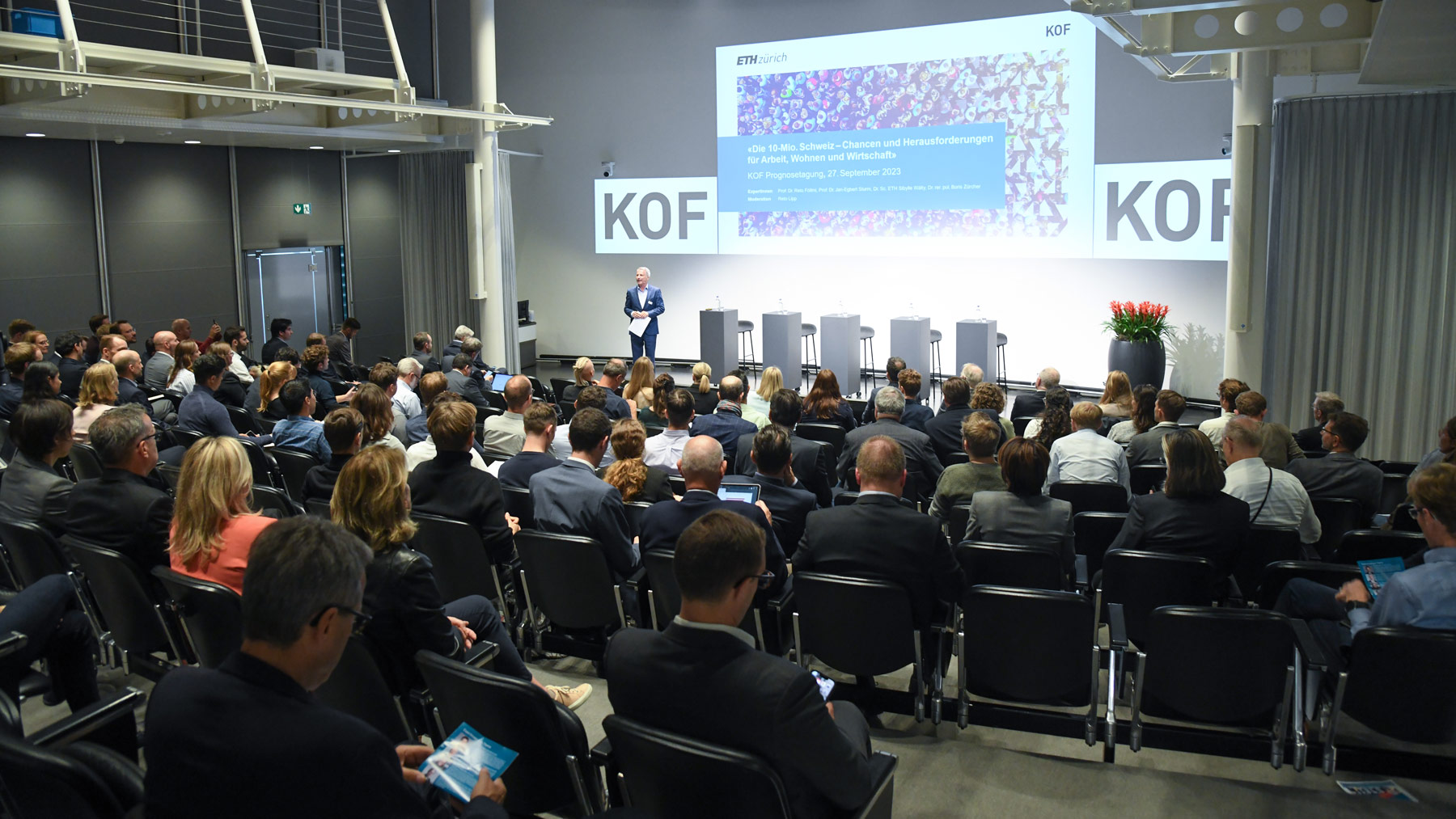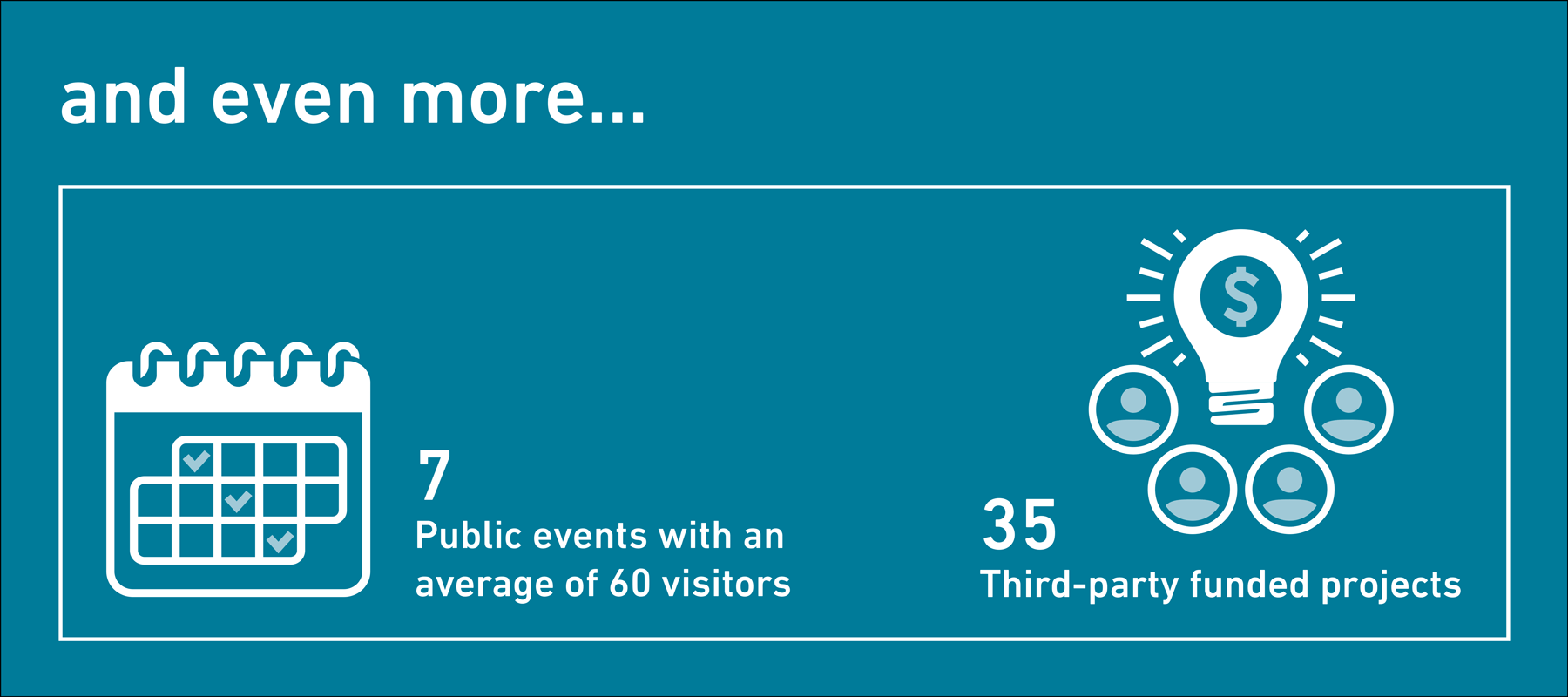Our institute
Last year was a fairly eventful one at KOF. These changes were triggered by the introduction of rules of procedure for the institute. KOF’s operations had previously been governed by an agreement between the Swiss Society for Economic Research (SGK) and ETH Zurich. The adoption of the new rules of procedure also meant the introduction of an Enlarged Directorate as well as a new senior management structure consisting of two directors. Other areas such as KOF’s General Assembly and the various approximate remits were also defined.
The implementation of the rules of procedure throughout the organisational structure and the institute’s strategic development over the coming years were the main topics discussed at a retreat attended by the members of both the Directorate and the Enlarged Directorate as well as the section heads and team leaders at the beginning of the year.
Key strategic issues for the future
The retreat held at the beginning of the year gave rise to seven key strategic issues, which were defined over the course of 2023 and which the institute plans to build on over the coming years. These points were also approved by the strategic committees and by the heads of the MTEC department, of which KOF forms part. These seven points cover the following:
- Deepen and expand the Business Tendency Surveys
- Renew KOF’s macro-model for the Swiss economy and its international relations
- Develop new tools to use in short- and medium-term scenarios for the Swiss economy
- Deepen investigation and analysis of the Swiss labour market
- Devise methods of measuring, analysing and improving the Swiss economy’s resilience to shocks
- Monitor Swiss innovation and competitiveness in leading technologies
- Develop a centre of competence for economic data
New research divisions at KOF
Another organisational change was the introduction of the KOF Lab. This research division is designed to test new economic approaches and models and acts as an incubator for research projects that researchers contribute and for which considerable potential is identified. The Lab was launched in mid-2023 and currently consists of four sections:

Public and Social Policy Design, led by Dr Andreas Beerli:
The section investigates key factors in human behavior that allow for the design of effective public and social policies.

Research Software Engineering and Economic Data (RSEED), led by Dr Matthias Bannert:
The section Research Software Engineering and Economic Data (RSEED) has set out to become a competence hub for research projects that embrace a data and programming driven approach to analysis.

Medium and Long-Term Scenarios, led by Dr Kieran Walsh:
The Medium and Long-Term Scenarios section of KOF Lab builds quantitative trade and dynamic macroeconomic models for performing policy counterfactuals and analysing shock scenarios related to the Swiss economy.

Inequality and Public Economics, led by Dr Isabel Martínez:
The section shows long-term trends in the distribution of market income and wealth, identifies structural upheavals and analyses the effects of political measures, institutions and economic forces on distribution.
A further organisational change was the merger of the research divisions ‘Macroeconomic Forecasting’ and ‘Data Science & Macroeconometric Methods’ to create the new research division ‘Macroeconomic Forecasting & Data Science’. This research division will initially be jointly led by Professor Michael Graff – until he retires at the end of May 2024 – and Dr Samad Sarferaz. Dr Saferaz will then be the sole head of this division from June 2024 onwards. This division comprises the sections covering the Swiss and international economies as well as the methods section. The latter will pursue the development of short-term models.
Small institute achieving high productivity
There were changes in the numbers of employees primarily in the research divisions and in the Chair of Applied Macroeconomics led by Professor Jan-Egbert Sturm. Members of staff from the research divisions and the Chair of Applied Macroeconomics moved to the new KOF Lab. KOF had a total of 52.1 employees measured in terms of full-time equivalents in 2023 (up by 5.6 compared with 2022).
KOF is relatively small compared with other economic research institutes in German-speaking countries, as shown by the table of a multi-institute comparison based on research monitoring in 2023. This comparison lists the various institutes based on the number of affiliated and monitored authors, the calculation of their publications in academic journals including the journal’s weighting, and the number of publications. Measured in terms of the average number of publications per author and the number of points measured in terms of the number of authors employed at an institute, KOF is relatively productive in this comparison and managed to maintain its position in the top two compared with the most recent ranking in 2021. However, this achievement was only possible because all parts of the institute worked closely together. To this end, new strategies and projects are developed not only by the research divisions but also by the support functions of IT, administration and communications.
IT: journeying towards a Kubernetes world
The IT team working at KOF is preparing for a transformation into a Kubernetes world. This means changing how the team develops and manages its applications. This major project offers an opportunity to use applications in a more flexible and coordinated way. Similar to a good conductor leading an orchestra, Kubernetes coordinates the various parts of an application and ensures that everything works smoothly. This enables the team to adapt more agilely, efficiently and swiftly to the changing requirements. The applications orchestrated by Kubernetes are portable and can be seamlessly executed on various cloud platforms and data centres. This means that applications can run consistently in various environments. This might also ensure that resources are used more efficiently.
Administration: evaluations monthly instead of quarterly or annually
KOF’s financial reporting system was rigorously developed and refined last year to enable it to switch from annual to monthly reporting based on a wide range of evaluations. This involved defining and successfully implementing the necessary foundations. The definition and implementation of these foundations form the backbone of a more efficient and precise financial management system and an improved planning process because the institute now possesses more specific data with which to budget and make strategic financial decisions. This is especially important as the institute has to comply with ETH’s cost-cutting requirements.
Even 85 years after KOF was founded, the Business Tendency Surveys form the basis of its work. In addition to the research divisions the institute’s support functions are also involved in ensuring that the necessary calculations are smoothly implemented, scrutinised and made available. This makes it possible to survey a panel of more than 7,000 firms on a monthly and quarterly basis and to achieve current response rates of 60 per cent. Some of the Business Tendency Surveys’ questions previously sent to customers in the manufacturing sector once a quarter are now supplied on a monthly basis. These questions ask about firms’ expectations in areas such as exports, sales prices and their business in general.
Communications: sharper focus on specific target groups
The Corporate Communications team completed the institute’s strategy of refining and refocusing its publications. The main priority is to make KOF’s research output accessible to a wider audience in a simple, understandable and targeted format. The number of outlets is being reduced and resources are being focused on a more comprehensive product. This will be made available on various easily accessible platforms and channels in order to appeal to a diverse audience, which will then be able to interpret economic policy issues better and obtain readily understandable information on KOF’s research findings.
Events
The events held by the institute in 2023 covered a broad spectrum of topical issues ranging from innovative trends in the Swiss economy and the challenges posed by global geopolitics to sustainable investment and how to deal with climate change.
The KOF Wirtschaftsforum held on 24 March 2023 saw experts presenting the latest innovative trends in the Swiss economy based on KOF’s Innovation Survey. They also discussed the findings of a study into the new innovation models being used by Swiss small and medium-sized enterprises (SMEs) and how these firms are reacting to the latest megatrends. In addition, the entrepreneurs Cornelia Stengel and Léonard Badet provided an insight into the innovation models used by their businesses.
The war in Ukraine has caused geopolitical turmoil. The confrontation between Russia and the West is bringing back memories of the Cold War. The tensions between China and the United States have also intensified. Speakers at the ‘Beyond the Borders’ event held on 26 May discussed Europe’s role in the concert of great powers.
The first event to take place after the summer vacation was the KOF Wirtschaftsforum, which explored the topic of sustainable investment and how firms can tackle climate change. Nora Ernst, Pascal Seiler and Jörg Schläpfer debated the question of where Swiss firms are on this, what climate change is costing them, and what the challenges and opportunities offered by climate change are.
On 27 September we welcomed around 120 guests to our annual forecasting conference. Professor Reto Föllmi, University of St Gallen, Professor Jan-Egbert Sturm, KOF Swiss Economic Institute, Dr Sibylle Wälty, ETH Zurich, and Dr Boris Zürcher, Labour Directorate, Swiss State Secretariat for Economic Affairs (SECO), discussed how Switzerland can exploit growth opportunities while, at the same time, devising sustainable strategies to meet the challenges of a growing population.
The last KOF Wirtschaftsforum of 2023 was held in November. Fabio Canetg moderated this event, which took place in the Audi Max lecture hall at ETH Zurich. The main topics on the agenda were inflation, rising rents and energy prices, and the forthcoming pay negotiations. Professor Sarah Lein, Professor Daniel Kaufmann and Dr Alexander Rathke helped to make this event such a success through their lectures and participation in the panel discussion.
The year was rounded off by the institute’s virtual ‘Beyond the Borders’ event, which examined the issue of long-term interest-rate forecasting and its significant impact on firms’ costs. Professor Jan-Egbert Sturm gave a lecture on the long-term outlook for interest rates. Professor Simon Evenett and Dr Charlotta Groth offered a supplementary perspective by investigating the impact that interest rates have on businesses and financial markets and by considering the latter’s effects on firms and investment strategies.
Externally-funded projects
After the volume of externally-funded projects had declined during and in the immediate aftermath of the COVID-19 pandemic, KOF managed to acquire a large number of new such projects in 2023. However, the number of projects also rose owing to the establishment of the KOF Lab, which acts as an incubator for new projects that are not internally funded.
Acquiring external funding is especially important for research projects, which are often conducted in collaboration or in conjunction with researchers working either in other parts of ETH or externally. KOF’s basic funding is provided by ETH Zurich and the Swiss Society for Economic Research (SGK). The implementation of large-scale research projects in particular, however, relies on the availability of external funding. A list of all new, ongoing and completed externally-funded projects can be found in the Download Activity Report (PDF, 1.1 MB), while this section focuses on individual, recently-acquired projects.
These projects include three conducted under the auspices of the Swiss National Science Foundation (SNSF): ‘Boosting refugee integration through psychological intervention’ in collaboration with the Immigration Policy Lab at ETH Zurich and the University of Zurich; ‘Identifying and overcoming barriers in accessing welfare programs: direct, spillover and downstream effects in a large-scale field study’; and ‘Intergenerational mobility: multi-dimensional patterns, determinants, and effects on beliefs’. Further projects include a collaboration entitled ‘Wirkungsevaluation des Modellversuchs ‹Ressourcenorientierte Betreuung und Sozialarbeit in der Untersuchungshaft›’ (Impact assessment of the model experiment “resource-based support and social work in custody”) together with the University of Zurich, which is being funded by the cantons of Zurich and Bern. This topic is also covered by a further collaborative research project run by the NOMIS Foundation and the University of Zurich and entitled ‘The effects of short-term incarceration’.
Researchers from KOF are also working on a project entitled ‘Durchführung von drei Studien zu möglichen Auswirkungen der Legalisierung von Cannabis’ (Conducting three studies on the potential effects of legalising cannabis). KOF will also collaborate with Bern University of Applied Sciences (BFH) to update the status report on Switzerland’s circular economy.
